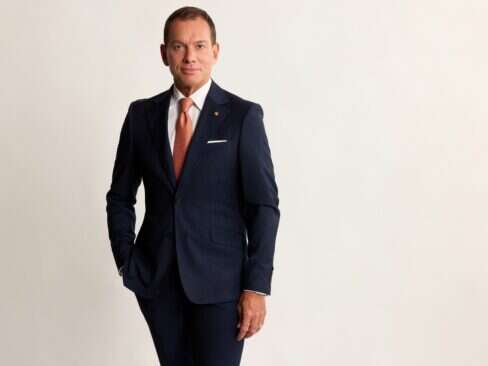
Global Brand LeaderSt. Regis and The Luxury Collection
With St. Regis and The Luxury Collection preparing for a frenzy of hotel openings around the world, Elite Traveler Editor-in-Chief Douglas Gollan caught up with Paul James, Global Brand Leader for the two groups, over afternoon tea at the famous St. Regis New York on Fifth Avenue. Their conversation covered what sets the two brands apart, how James and his team are trying to make elite travel more interesting and how his luxury groups fit within a company that features a multitude of brands, from W and Le Meridien, to Westin and Sheraton, to Four Points by Sheraton and Aloft.
ET: What’s the difference between a St. Regis and a Luxury Collection hotel?
Paul James: St. Regis is a classic luxury brand. It has a rich heritage that informs every touch, from fresh flowers, butlers, libraries, open fireplaces, afternoon tea service and midnight supper. The Bloody Mary, a signature cocktail of St. Regis since it was first made right next door in the King Cole Bar and Lounge, is now brought to life through new interpretations that reflect the distinct personality of each property. You may have 10 homes, but while the home in Malibu is going to be different from the apartment in New York, there are still similarities and the icons of your ownership. St. Regis is luxury as seen through the lens of John Jacob Astor [the founder of the hotel who famously went down with the Titanic] for today. With The Luxury Collection, it is all about “how can we open up a destination in a way that you might not expect?” Each hotel is unique and special, so with The Luxury Collection you magnify the experience of the destination. For example, our concierges have been trained to be less transactional and more focused on what the guest is really looking for. So if a guest says make a reservation at restaurant X, the concierge would find out if the guest is interested in other suggestions, and then essentially qualify what they want to experience and maybe recommend something they might enjoy even more. We’ve introduced a Cultural Calendar, so if you come to our web site, instead of just entering a city and dates, you can enter a time period in which you want to travel and the calendar will come back with all the events around the world where we have hotels during that period. So maybe you never would have thought about the Helsinki Herring Festival, but now that interests you so you can hop on your jet.
ET: So it’s all about experience?
Paul James: Not really. Every press release is “experience this”, or “experience that”, but what we are really trying to do is show customers unique experiences. So it could be going marketing with a chef at one of our hotels—or here in New York, after Bottega Veneta closes next door, arranging private shopping for you. Or maybe it is a private museum tour.
ET: Have the last two years been a difficult period in the luxury hotel business?
Paul James: I heard somebody say recently it is “officially” the worst since the Great Depression. However, one interesting thing we’ve seen is while overall occupancy was down, occupancy among our most loyal customers, members of Starwood Preferred Guest, was actually up. So it was a pretty strong message. People who stay with St. Regis or The Luxury Collection like us, we just have to get the word out to more people.
ET: What about cutbacks? When business is down it is difficult to maintain expenses, yet the customers who come to your hotels can still obviously afford to pay for the best.
Paul James: One of the things we decided early on is that we have to protect the customer. That’s the advantage of being part of Starwood. We had the opportunity to save money and do things better behind the scenes. Maybe it was collaborating on buying napkins, or back of the house consolidations, or rationalizing our sales organization. At the end of the day, we became more efficient without touching the customer.
ET: Are you seeing a recovery?
Paul James: There are places we’ve done well throughout. India and China are strong. In certain places where there is a lot of government business, there were more meetings with more government officials trying to solve the crisis. Overall business started to come back in September, led by leisure. In January corporate travel started coming back, and if you look at Smith Travel Research, in March ADR [Average Daily Rate] stabilized and maybe moved up a notch.
ET: I understand there are a number of openings coming up in the next few months.
Paul James: By the beginning of 2011, in the approximately three years I’ve been here we will have doubled our properties to 24. Between St. Regis and The Luxury Collection we have Bangkok, Lhasa, Osaka, Mauritius, Bahia Beach, Tianjin and three properties in Peru. So if you look between The Luxury Collection and St. Regis and you add in the W Hotels that fit into the five-star category, we are up to around 140 hotels in the five-star category across the portfolio.
ET: Speaking of the portfolio and your parent company Starwood, some eyebrows were raised a couple years ago when a “beer guy”, Frits van Paasschen, was appointed as your CEO.
Paul James: Actually, Frits is probably a good representative of the type of guest we are targeting. He is the next generation of luxury customer. He was appointed CEO at 46 and he knows the business of business. He is a global practitioner with background at Coors and Nike. He grew up between Holland and Seattle, so he is global. He has a young family. He is competitive. He is a marathoner. And if you look at the companies he comes from, they are companies where you need to understand the consumer. To cater to this customer you have to be personal, quick, efficient and you can’t be overly stuffy but you still have to be protective of their privacy and private time.
ET: So overall, is being part of Starwood a positive?
Paul James: The advantage for St. Regis and The Luxury Collection being part of Starwood is that when I want state-of-the-art technology, I can go two doors down and get the best minds in the business. If we were a small stand alone company that wouldn’t be the case. And if you think about the heritage of Sheraton, it was part of ITT. ITT was an infrastructure company, so virtually anywhere in the world we go, when we are opening a St. Regis or Luxury Collection property, Starwood through Sheraton has been there for decades. We’ve been in Mexico since 1963, India since 1973, Dubai since the ‘70s, China since 1983. We bring a lot of experience [other luxury brands] don’t have for guests when they open a new hotel somewhere.
ET: And how is the pipeline moving forward after the upcoming openings?
Paul James: Kuala Lumpur and Buenos Aires are moving forward. In fact, only one confirmed project fell off. That said, there are a lot of hotel projects designed and ready to go, so this is actually a good time for ultra-high net worth investors who are looking for ready-made projects.














